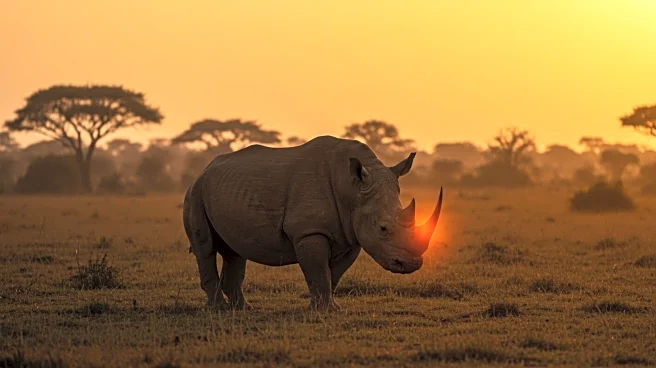What is the story about?
What's Happening?
South African authorities have charged six individuals in connection with a large-scale rhino horn trafficking operation. The suspects, including John Hume, a former owner of the world's largest rhino farm, are accused of orchestrating a scheme involving 964 rhino horns intended for illegal markets in Southeast Asia. The investigation, which lasted seven years, revealed fraudulent activities involving permits obtained under false pretenses to facilitate domestic trade, which were then used to funnel horns into international markets. The arrests are seen as a significant step in combating wildlife crime, as South Africa continues to face a poaching crisis, with 420 rhinos killed in 2024 alone.
Why It's Important?
The arrests underscore the ongoing challenges in protecting endangered species like rhinos, which are targeted for their valuable horns. Rhino horn can fetch over $60,000 per kilogram on the black market, making it more valuable than gold or diamonds. The illegal trade is driven by demand in countries like Vietnam and China, where rhino horn is used in traditional medicine despite lacking proven medicinal benefits. The crackdown on this trafficking operation highlights South Africa's commitment to preserving its wildlife and addressing the poaching crisis, which threatens the survival of rhinos globally.
What's Next?
The suspects have appeared in court and face charges including fraud, theft, and violations of environmental protection laws. Additional charges of racketeering and money laundering are under consideration. The case is expected to proceed through the legal system, with potential implications for wildlife conservation policies and enforcement strategies. South African authorities may increase efforts to monitor and regulate domestic rhino horn trade to prevent further illegal activities.
Beyond the Headlines
The case raises ethical questions about the balance between legal trade and conservation efforts. John Hume, one of the accused, has advocated for legalizing international rhino horn trade, arguing it could reduce poaching by flooding the market with ethically harvested horns. This perspective contrasts with conservationists who fear it could exacerbate poaching by increasing demand. The arrests may influence future debates on wildlife trade policies and conservation strategies.















